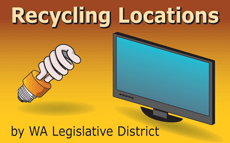Recycling, China, and EPR
The recycling industry is feeling the effects of China's ban on importing certain recyclables.
Nina Bellucci Butler of MORE Recycling points out that the severe challenges in the recycling field many are now facing are because "the market for recycled materials is broken. We have equated collection with recycling when in reality that is just the first of many steps to ensure complete reabsorption of resources." How do we fund a system to sort plastics into discrete resins? "If we fail to reinstitute market development programs and implement the policies necessary to stimulate value in [post-consumer plastic] scrap, plastic will undoubtedly become waste or marine debris."
Kate Bailey of Eco-Cycle Solutions: "The real problem isn’t China. The real problem is that the prolific, ever-increasing production of plastics is choking our planet, our oceans and our bodies. Recyclers did not create the plastic waste crisis—the plastics industry did, and it's time we said enough is enough."
"We as the recycling industry need to be honest: Plastics recycling has always been mediocre at best and cannot keep pace with the explosion of plastics on the market—and it never will. The use of plastics has increased twenty-fold in the past 50 years, yet only nine percent of plastics made since 1950 have been recycled. Most of those plastics that were recycled were down-cycled into lower-grade, single-use products, rather than kept in a continuous loop.
Yet recyclers now find themselves on the frontlines of this international crisis. As an initial response, we need to rapidly develop stronger domestic markets for plastics recycling and more expansive education programs to reduce contamination. But what we really need is to stop the onslaught of plastic waste by first acknowledging that recycling alone cannot solve the problem. Then we need a meaningful dialogue with all stakeholders, including the plastics industry, about how and when plastics do or don't fit into the circular economy of the 21st century... I suggest we start building from the New Plastics Economy vision put forth from the Ellen MacArthur Foundation."
The Statesman Journal quotes Oregon DEQ's Peter Spendelow: "we must insist that if manufacturers want to sell their products in environmentally unfriendly containers, they must have an efficient system for collecting the empty plastic. This ‘product stewardship’ will let us ‘recycle smarter.’"
Regarding extended producer responsibility (EPR) for packaging, a 2017 Connecticut task force studied strategies for reducing consumer packaging that generates solid waste. They considered but rejected the option of a producer responsiblity system similar to British Columbia's Recycle BC EPR for packaging and printed paper, instead recommending tax incentives, public-private partnerships, evaluation of mixed-waste processing, and utilization of unclaimed bottle deposits to fund waste-reduction initiatives.
Recycle BC, the nonprofit stewardship organization which manages the producer funded packaging EPR system in British Columbia, is weathering the China ban better than some, with local processing capacity. Recycle BC's managing director, Allen Langdon, spoke on Roundhouse Radio Vancouver about the BC system, "where producers of packaging are actually paying to manage this themselves instead of local government." Langdon will be the keynote speaker at the May 2018 Washington State Recycling Association conference.
